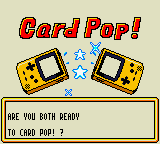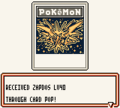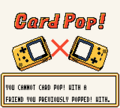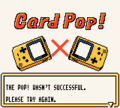Card Pop!
Card Pop! (Japanese: カードポン! Card Pon!) is a multiplayer feature in the video games Pokémon Trading Card Game and Pokémon Trading Card Game 2: The Invasion of Team GR!. This can be used to briefly connect two games through infrared, causing each game to receive a random card.
Hardware
In the Japanese version of the first game, the Card Pop! feature uses the built-in infrared receiver and transmitter included in the cartridge itself (the black and purple components, respectively, towards the top left and top right of the printed circuit board). This makes it possible to use Card Pop! on an original Game Boy or Game Boy Pocket. The game does not allow to Card Pop! on the Super Game Boy or Super Game Boy 2 for the SNES, nor the Game Boy Tower from Pokémon Stadium series (as it virtually behaves as a Super Gameboy 2). Game Boy Advance runs in Game Boy Color mode, so it is possible to Card Pop! on that console. The Game Boy Player for GameCube essentially has a Game Boy Advance hardware so it is compatible as well.
In the American and European versions of this game, as well as in the second game (only released in Japan), the infrared communications port of the Game Boy Color is used instead for this feature.
Overview
When two games are connected via infrared, each player will receive a random card. A player cannot Card Pop! with the same partner save file again until both players have used the feature with fifteen others, causing their partner's ID is overwritten in both save files. If the save file is deleted, all Card Pop! data is deleted, so whether a new save file can Card Pop! with another game's save file is unaffected by the players the previous save file performed Card Pop! with.
Card Pop! is the only way to obtain certain Phantom Cards (Mew in Pokémon Trading Card Game; Lugia and Here Comes Team Rocket! in Pokémon Card GB2). While Venusaur is intended to be obtainable as well, a programming error makes it unobtainable.
Like all multiplayer features, Card Pop! is disabled in the Nintendo 3DS Virtual Console release of Pokémon Trading Card Game.
Mechanics
The save file ID is the player's name characters (converted to numbers), and a secret number (from 0 to 65535) created at random within a new save file, unknown to the player. This means that connecting to two different partners, even with both the same name, most likely will still be connecting to two different ID's, yielding different Card Pop! rewards. This ensures that the card received is always apparently random from the player's perspective, and to allow Card Pop! with other players that share the same name.
On the other hand, if both connecting players' ID's are fully known (including the secret numbers), then both rewards can be exactly determined. In other words, the Card Pop! rewards are exclusively determined by both save file IDs. This implies that if two players are able to Card Pop! a second time, they both will receive the same exact card they received the first time, respectively, which can be verified by overwriting the partners ID list as mentioned above.
When a player Card Pop! with another, first the rarity of the rewarded card is determined. Assuming two random ID's, the probability of each category is given at the table below. Energy and Promotional cards are not included in any category (the only special exception being Phantom Cards).
| Rarity | Probability |
|---|---|
| Common | 101/256 (39.5 %) |
| Uncommon | 90/256 (35.2 %) |
| Rare | 63/256 (24.6 %) |
| Phantom Card | 1/256 (0.4 %) |
Once the rarity category is selected, the list of all cards of that rarity are "shuffled" as if it was a deck, then the resulting top card will be the rewarded card. The Phantom Card category is handled separately, where it was intended to reward Venusaur or Mew with a 50% chance each, but due to a programming bug, it always results in Mew, making Venusaur unobtainable.
Compatibility
Card Pop! cannot be performed between Pokémon Trading Card Game and Pokémon Trading Card Game 2: The Invasion of Team GR!. Attempting to do so can result in glitches such as a game freeze or a loss of save data in Pokémon Trading Card Game.
The Japanese version of the first game cannot Card Pop! with a non-Japanese version of the same game. Not only the infrared LEDs are misaligned between cartridge and Game Boy Color, but their infrared communication protocols are different as well; so even if signals were to be sent and received, the games end up not understanding each other and nothing happens.
On the other hand, American and both European versions of the first game are compatible and can Card Pop! between each other.
Gallery
Trivia
- In practice, the Card Pop! outcome is one out of 65536 possible results at random, but not all cards have the same chances of being selected. Although the Phantom Card Mew is only obtainable via Card Pop! with a 1/256 chance, it is not the rarest card to obtain by this method. In fact, Pokémon Breeder is the least frequent of all possible Card Pop! cards, with a 64/65536 (1/1024) chance. The most probable card to receive through Card Pop! is Squirtle, with a 522/65536 chance. Of course the rarity category probabilities do play an effect, but these differences also have to do with how the pseudo-random number generator works and how it affects the card shuffling mechanism.
- If a player is allowed to Card Pop! with another, but the other is not (i.e. the partners ID list of the first one has been overwritten, but their ID is still registered on the second's), then if they try to Card Pop!, the first player will actually receive a card, whereas the other will get Card Pop! denied. This happens due to a small programming bug when checking the name on each player's list of current partners.
In other languages
| ||||||||||||||||||

|
This article is part of both Project Sidegames and Project TCG, Bulbapedia projects that, together, aim to write comprehensive articles on the Pokémon Sidegames and TCG, respectively. | 
|








